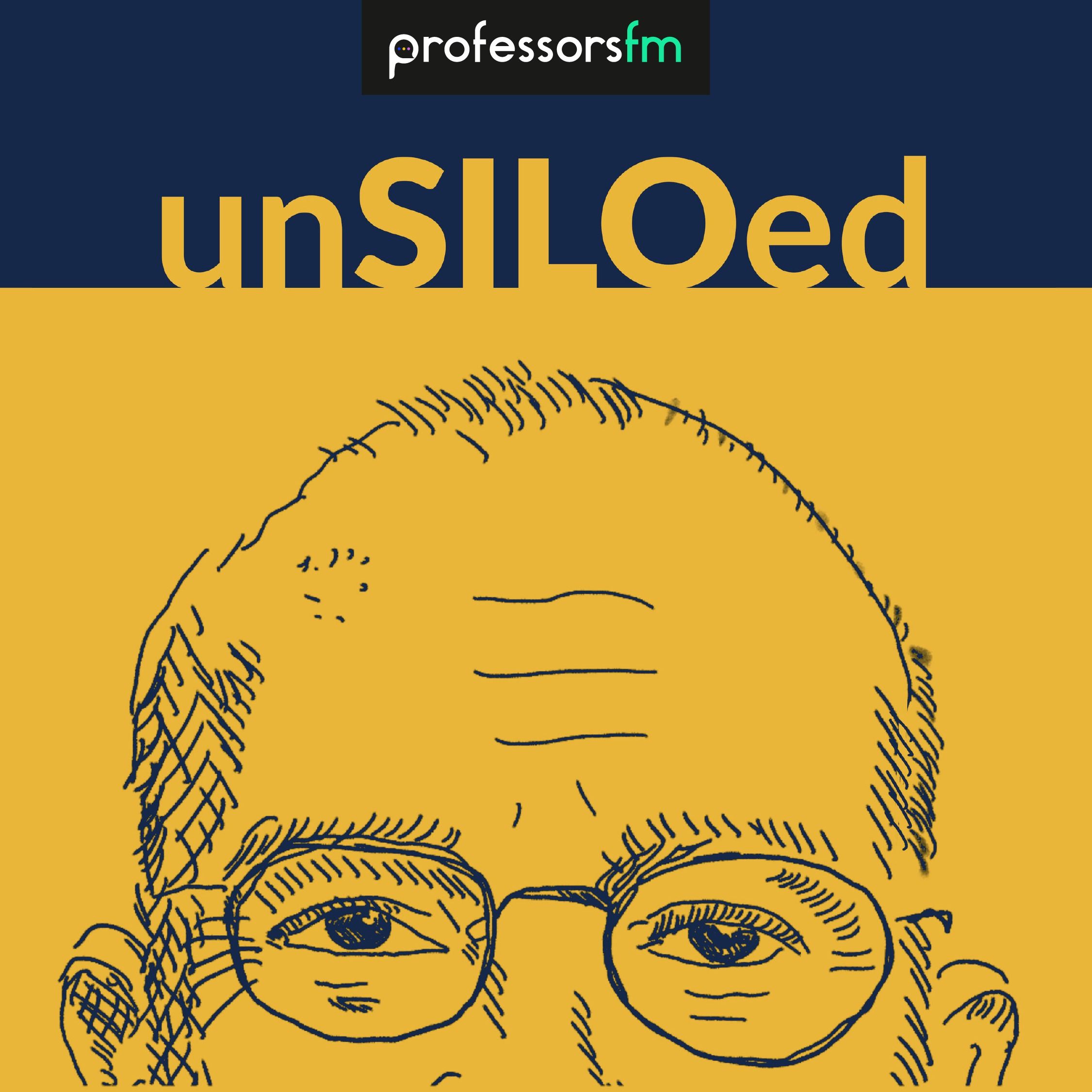

unSILOed with Greg LaBlanc
Greg La Blanc
unSILOed is a series of interdisciplinary conversations that inspire new ways of thinking about our world. Our goal is to build a community of lifelong learners addicted to curiosity and the pursuit of insight about themselves and the world around them.*unSILOed Podcast is produced by University FM.*
Episodes
Mentioned books

12 snips
Feb 3, 2026 • 55min
617. Navigating Leadership Challenges: Analyzing Systems with Barbara Kellerman
Barbara Kellerman, Harvard leadership scholar and co-founder of the Center for Public Leadership, challenges conventional leadership thinking. She explores how bad leaders persist, the three-part system of leaders, followers, and context, why followers comply, warning signs of harmful leadership, and how shifts like COVID and AI reshape power and removal strategies.

11 snips
Jan 30, 2026 • 45min
616. Leading Through Learning: Lessons from Life as a CEO with Jeff Immelt
Jeff Immelt, former GE CEO and current Stanford instructor and venture partner, shares leadership lessons from a long industrial career. He discusses generational career shifts, why CEOs need practice and teaching, and GE’s training and rotation model. Conversations cover organizational design, metrics that fit different businesses, and the value of systems thinking and iterative partnership approaches.

22 snips
Jan 26, 2026 • 1h
615. Reclaim Your Life from Digital Overload with Paul Leonardi
Paul Leonardi, Duca Family Professor of Technology Management at UC Santa Barbara and author of Digital Exhaustion, explains why digital tools both help and drain us. He discusses matching tools to tasks, the 30% rule for technical fluency, switching costs across dozens of apps, the exhaustion triad of attention/inference/emotion, and practical norms and offline activities to reclaim focus.

10 snips
Jan 23, 2026 • 54min
614. Understanding the Great Divergence: Europe vs China from 1000 to 2000 feat. Guido Tabellini
Guido Tabellini, professor of Political Economics at Bocconi and co-author of Two Paths to Prosperity, explores why Europe and China diverged from 1000–2000. He discusses a reversal of fortunes, the roles of corporations versus clans, state capacity and fragmentation, how religion shaped cooperation with strangers, and the institutional roots shaping modern development.

10 snips
Jan 19, 2026 • 52min
613. Challenging Bureaucracy: Management Insights with Gary Hamel
Gary Hamel, a renowned management scholar and founder of the Management Lab, dives into the intricacies of bureaucracy and its impact on innovation. He discusses how bureaucratic practices, despite their inefficiencies, persist due to historical legacies. Hamel emphasizes the need for companies to shift towards more human-centric and decentralized models to foster creativity and adaptability. He also critiques the limitations of current management structures and advocates for finding ways to integrate exploration with exploitation for organizational success.

22 snips
Jan 15, 2026 • 55min
612. Cracking the Code of Effective Meetings with Rebecca Hinds
Rebecca Hinds, Head of the Work AI Institute at Glean and author of Your Best Meeting Ever, explores the art of effective meetings. She delves into the two-pizza rule, emphasizing that smaller groups yield better outcomes. Rebecca exposes the dangers of meeting bloat fueled by visibility bias and offers practical solutions like calendar cleanses and zero-based meeting design. She also discusses the role of data in measuring collaboration, the essential partnership between HR and IT, and how to foster psychological safety in workspaces for meaningful decision-making.

25 snips
Jan 12, 2026 • 55min
611. Finding a Strategy for Life, Business, and Everything in Between feat. Geoffrey A. Moore
Geoffrey A. Moore, a seasoned technology consultant and author of influential strategy books, shares his insights on navigating complex systems in business. He discusses the critical role of narrative in decision-making, particularly when data is scarce, and he argues for the inclusion of sales training in business schools. Moore also delves into his latest work, 'The Infinite Staircase,' exploring life's meaning through a framework of emergence and ethics. Additionally, he examines the evolving nature of corporate strategy amidst disruption and the importance of authentic leadership.

Jan 8, 2026 • 51min
610. Shaping Spaces: Architecture, Design, and Urban Planning with Witold Rybczynski
Witold Rybczynski, an emeritus architecture professor at the University of Pennsylvania and author of several acclaimed books, shares insights on the cultural and practical significance of architecture. He explores how architecture differs from fine arts and the lasting impact of city planning in the U.S. versus Europe. Rybczynski discusses the unique features of American cities, the role of mobility in shaping home perceptions, and the interplay of style and function in car design. He emphasizes the importance of historical context in architecture and its relevance in business.

10 snips
Jan 5, 2026 • 45min
609. The Evolution of Science: From Natural Philosophy to Modern Understanding feat. Peter Dear
In this discussion with Peter Dear, an emeritus professor of history at Cornell University, the complexities of scientific evolution are unveiled. Peter argues against the simplistic notion of linear progress in science, emphasizing its cultural and contingent nature. He explores the transformative impact of the Renaissance and the 19th century on modern practices. The conversation touches on the historical significance of experimentation, the interplay between natural philosophy and practical science, and how figures like Newton and Darwin shaped our understanding of science today.

14 snips
Dec 22, 2025 • 56min
608. Why Imperfection Is Core to Being Human feat. Laurence D. Hurst
Laurence D. Hurst, a Professor of evolutionary genetics at the Milner Centre for Evolution, discusses the fascinating limitations of evolutionary perfection. He reveals why humans are afflicted with genetic disorders and high mutation rates, countering the assumption that evolution leads to optimal adaptations. The conversation dives into how maternal costs and fetal-maternal conflicts impact human health, the role of gene therapy in modern medicine, and the ethical dilemmas surrounding germline editing, emphasizing the importance of embracing our inherent imperfections.


